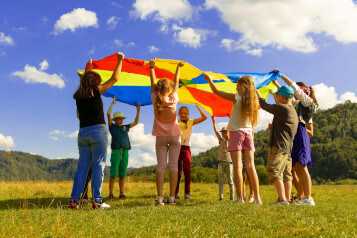Behavior Chart
Nurturing Your Child's Social Side

Building strong social relationships is an important part of childhood development. Friendships are crucial for building essential life skills as well as boosting emotional well-being. Friendships also provide a support system as kids navigate the ups and downs of childhood. As parents and caregivers, there are several ways to nurture your child’s social side. Here’s how you can help your kids thrive!
Children learn by watching adults. You can demonstrate positive social interactions by being friendly and respectful to others. Show empathy, listen actively, and communicate openly. When your child sees you engaging in healthy relationships, they’ll be more likely to mimic those behaviors.
Create opportunities for your child to interact with friends. Organize playdates, encourage participation in group activities like sports, arts, or clubs, and explore community events. These settings provide a great opportunity for kids to share interests and develop friendships.
Some kids may need a little extra help when it comes to social skills. Teach kids the basics like how to introduce themselves, ask questions, and engage in conversations. Role-playing can help them practice these skills in a safe environment. Remind kids the importance of taking turns, sharing, and expressing feelings!
Not only is it important for kids to recognize and understand their own feelings, but they also need to recognize the emotions of others. Discuss feelings openly. Encourage kids to express themselves. This can be done through feeling charts, storytelling, discussing characters in books or movies, or simply talking about daily experiences. Understanding emotions is an important part of forming strong social connections.
Teach kids the importance of kindness and empathy. Community service projects are a great way to teach empathy while helping others. Possibly set up a family service project where everyone works at a soup kitchen or neighborhood clean-up. Talk with kids about the impact of their actions on others, and encourage them to be inclusive and supportive friends!
In today's digital age, friendships often include the virtual world. While technology can help kids connect, it’s essential to monitor their online interactions. Encourage them to use social media responsibly and promote face-to-face interactions whenever possible.
Expose your child to different cultures, backgrounds, and perspectives. Attend cultural events in your community. Discuss different cultures and ways of living through books, movies, and events. This can enhance their understanding and acceptance of others, helping them to build diverse friendships.
Pay attention to your child’s friendships. Though you want to encourage independence, being involved in their social life can help you guide them toward positive relationships. If you notice negative influences, gently discuss your concerns and explore alternative friendships together.
Friendships can be complicated, and kids will inevitably face challenges. Teach your child how to cope with conflicts, disappointments, and rejection. Discuss strategies for problem-solving and teach the importance of moving forward and making new friends if there is a set-back.
Nurturing relationships in children is an integral part of a child’s emotional and social development. By modeling positive behavior, providing opportunities for interaction, and teaching essential social skills, you can help your child build lasting friendships. Remember, the goal is to equip them with the tools they need to navigate social situations confidently and compassionately. This will lay the foundation for meaningful connections throughout their lives!
